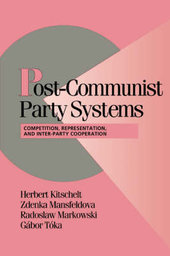
|
Post-Communist Party Systems: Competition, Representation, and Inter-Party Cooperation
Paperback / softback
Main Details
| Title |
Post-Communist Party Systems: Competition, Representation, and Inter-Party Cooperation
|
| Authors and Contributors |
By (author) Herbert Kitschelt
|
|
By (author) Zdenka Mansfeldova
|
|
By (author) Radoslaw Markowski
|
|
By (author) Gabor Toka
|
| Series | Cambridge Studies in Comparative Politics |
|---|
| Physical Properties |
| Format:Paperback / softback | | Pages:476 | | Dimensions(mm): Height 229,Width 153 |
|
| ISBN/Barcode |
9780521658904
|
| Classifications | Dewey:324.20943 |
|---|
| Audience | | Tertiary Education (US: College) | | Professional & Vocational | |
|---|
| Illustrations |
68 Tables, unspecified; 24 Line drawings, unspecified
|
|
Publishing Details |
| Publisher |
Cambridge University Press
|
| Imprint |
Cambridge University Press
|
| Publication Date |
13 August 1999 |
| Publication Country |
United Kingdom
|
Description
Post-Communist Party Systems examines democratic party competition in four post-communist polities in the mid-1990s, Bulgaria, the Czech Republic, Hungary, and Poland. Legacies of pre-communist rule turn out to play as much a role in accounting for differences as the institutional differences incorporated in the new democratic rules of the game. The book demonstrates various developments within the four countries with regard to different voter appeal of parties, patterns of voter representation, and dispositions to join other parties in legislative or executive alliances. The authors also present interesting avenues of comparison for broader sets of countries.
Reviews"Welcome in the field." Comparative Politics "This hefty tome is the most substantial piece of research yet to emerge from the study of the transition to democracy in Eastern Europe." Choice "This hefty tome is the most substantial piece of research yet to emerge from the study of the transition to democracy in Eastern Europe." Choice "This outstanding volume, authorized by a multi-national team and deploying an empirically sophisticated and theoretically driven research program, attempts to explain variation in the quality of democratic accountability, governability, and responsiveness in four postcommunist states...The result is an engaging and highly nuanced account that highlights the structuring role of communist-era legacies in shaping choices concerning new political institutions and the quality of democratic procedures...the book is theoretically rich, methodologically innovative, and opens new avenues for further research...a work of great distinction." Slavic Review
|